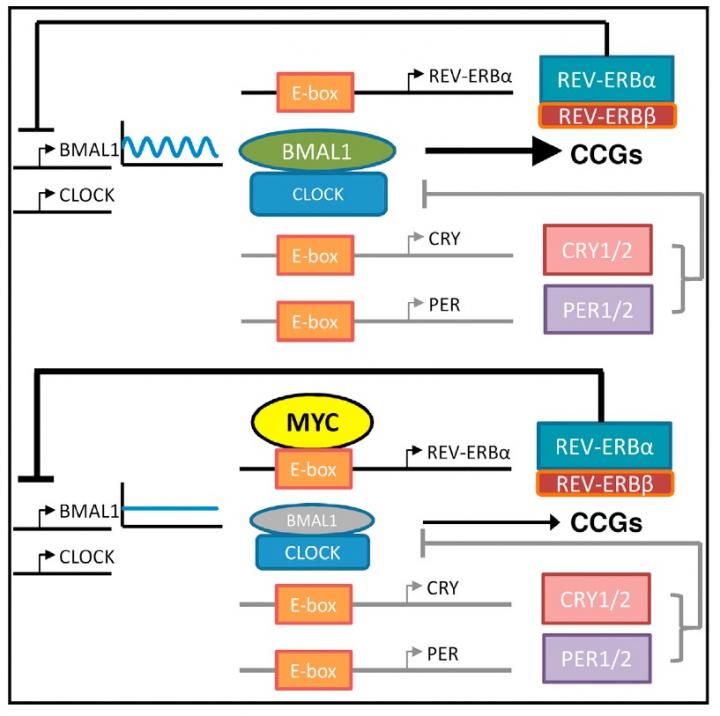![Oncogenic MYC disrupts the molecular clock and alters circadian glucose metabolism and glutaminolysis in favor of growth-related biosynthesis in cancer cells. Both MYC and N-MYC upregulate REV-ERBa, which suppresses BMAL1 expression and oscillations. [Perelman School of Medicine, University of Pennsylvania; Cell Metabolism]](https://genengnews.com/wp-content/uploads/2018/08/99393_web9424412061-1.jpg)
Oncogenic MYC disrupts the molecular clock and alters circadian glucose metabolism and glutaminolysis in favor of growth-related biosynthesis in cancer cells. Both MYC and N-MYC upregulate REV-ERBa, which suppresses BMAL1 expression and oscillations. [Perelman School of Medicine, University of Pennsylvania; Cell Metabolism]
The importance of maintaining an appropriate circadian rhythm has been well established by scientists for a number of years. Yet, the role of a proper 24-hour internal cycle for the metabolic pathways in cancer cells has been relatively unexplored.
Now, researchers from the University of Pennsylvania Perelman School of Medicine have discovered what they believe is a disruptor of the regular circadian rhythm in many types of cancer cells. The scientists found that the transcription factor MYC promiscuously binds to promoter regions for crucial genes that are required to maintain normal daily metabolic cycles.
“Our data suggest that MYC-driven cancers have altered circadian oscillation due to upregulation in another clock protein called REV-ERBα and that these MYC cancers may be good candidates for chronotherapy,” explained co-lead author Brian Altman, Ph.D., postdoctoral fellow at the University of Pennsylvania Perelman School of Medicine. “This work ties together the study of cell metabolism and cancer chronotherapy—if cells don't have to rest, they may replicate all the time, with no breaks at all.”
The findings from this study were published recently online in Cell Metabolism through an article entitled “MYC Disrupts the Circadian Clock and Metabolism in Cancer Cells.”
The Penn researchers found that MYC was a dual-action protein. In addition to its role in metabolic pathways, MYC also works directly on damping BMAL1—a tumor-suppressor that typically increases REV-ERBα activity. In essence, MYC is suppressing the suppressor.
“Understanding these basic mechanisms should lead to better cancer treatment strategies that reduce side effects and increase effectiveness,” stated co-lead author Annie Hsieh, M.D., doctoral student in the lab of senior author Chi Van Dang, M.D., Ph.D., director of the University of Pennsylvania Abramson Cancer Center.
In the current study, the investigators knew that MYC bound to the genome through sites that are identical to the binding sites of BMAL1 and they hypothesized that aberrant MYC expression perturbed the clock by deregulating components of the circadian network in cancer cells.
They researchers also found that deregulated expression of MYC disrupts the molecular clock in cell lines by directly inducing REV-ERBα to dampen expression and oscillation of BMAL1. Moreover, the disrupted circadian oscillations in the MYC-expressing cancer cells could be partially rescued by inhibiting expression of REV-ERBα.
The research team also suspected that MYC could dramatically alter the oscillations of glucose metabolism and perturb the consumption of glutamine, both essential metabolic molecules for cells. To address this, they studied an osteosarcoma cancer cell line for the interaction of MYC and metabolism in cancer cells. “We thought that some cancer cells' metabolites oscillate and some don't, but we had not tested it,” Dr. Altman noted. The glucose pathway in this cell line oscillates normally. Yet, when they increased MYC, the oscillations vanished, and glucose was taken up at a much higher rate.
“This led us to better understand how and why cancer cells efficiently hijack the cell's energetics machinery to be able to keep up rapid replication,” Dr. Hsieh said.
This study allowed the scientists to understand better that cancer cells have different metabolic profiles. Additionally, they hypothesize that this information can be exploited for chemotherapeutic drug purposes.
“Our results demonstrate an unsuspected link between the cancer-causing abilities of some cells and abnormal circadian and metabolic rhythms, which we surmise to be advantageous for cancer,” concluded Dr. Dang.


